Introduction
- Assessments play a critical role in the learning and development of children.
- Teachers use assessments to gain insights into the depth of knowledge levels.
- Assessments assist in identifying the children who need special services (Brown & Rolfe, 2009).
- Assessments are designed to examine the reasoning, language development, and the processing skills.
They provide the teachers and parents with information on the attention span of the child and the style of learning. In general assessments provide objective insight into the child’s ability profile.
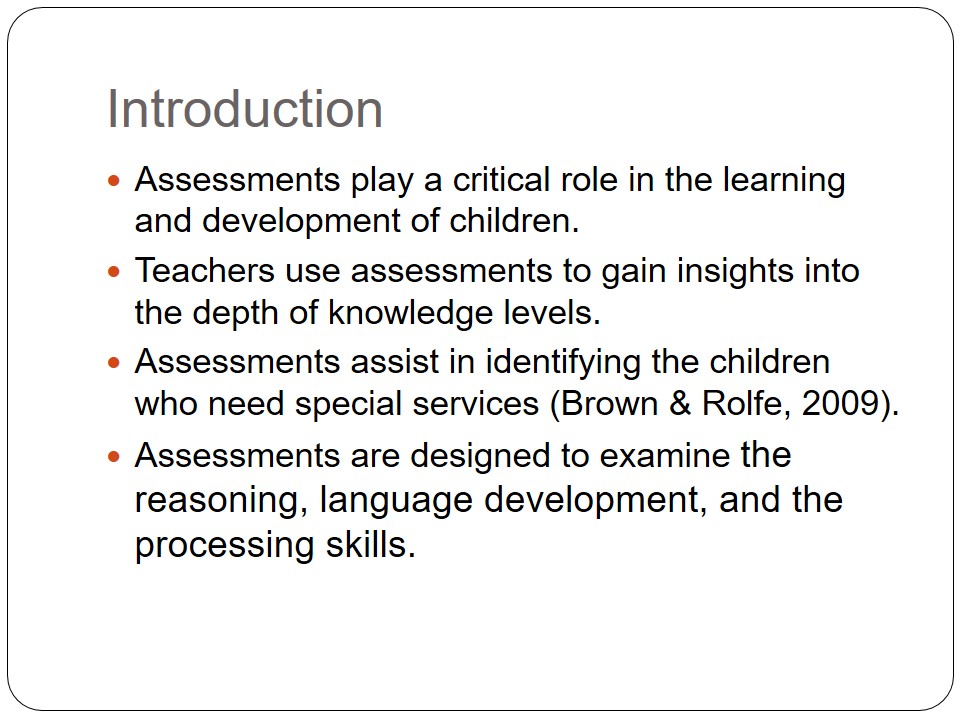
The Current Status of Assessment
- There are two main types of assessments, formative and summative .
- In the United States, there are different assessment tools used for early childhood learning. The tools were developed in the 80s and 90s (Glazzard, Chadwick, Webster & Percival, 2010)
- Examples of the tools include:
- Peabody Picture Vocabulary Test (PPVT-IV).
- Early Childhood Environment Rating Scale- Revised (ECERS-R).
- Classroom Assessment Scoring System (CLASS).
- Early Childhood Developmental Inventory etc.
- There have been considerable changes in the education requirements.
- For example, the implementation of early childhood learning that places a lot of emphasis on the needs of the 21st century (Biggs, 2008).
- The current curriculum is based on Common Core Standards for English Language Arts (ELA) (Biggs, 2008).
- The composition of the current classrooms has become more diverse.
- Current classrooms are characterized by diversity (cultural and linguistic).
- For example, the percentage of English language learners (ELL) has been on the increase (Yunus,2014).
- In 2002-2003, ELL comprised 8.7%.
- In 2011-2012 it increased to 9.1% (4.4 million students).
The students being assessed have different needs. For instance, the classrooms may have students with specific learning disabilities. This calls for different assessment tools that recognize the needs of the children.
The ELA set guidelines for English language literacy, history, social sciences and technical subjects. They are developed based on the understanding of the diversity inherent in learning places in 21st century.
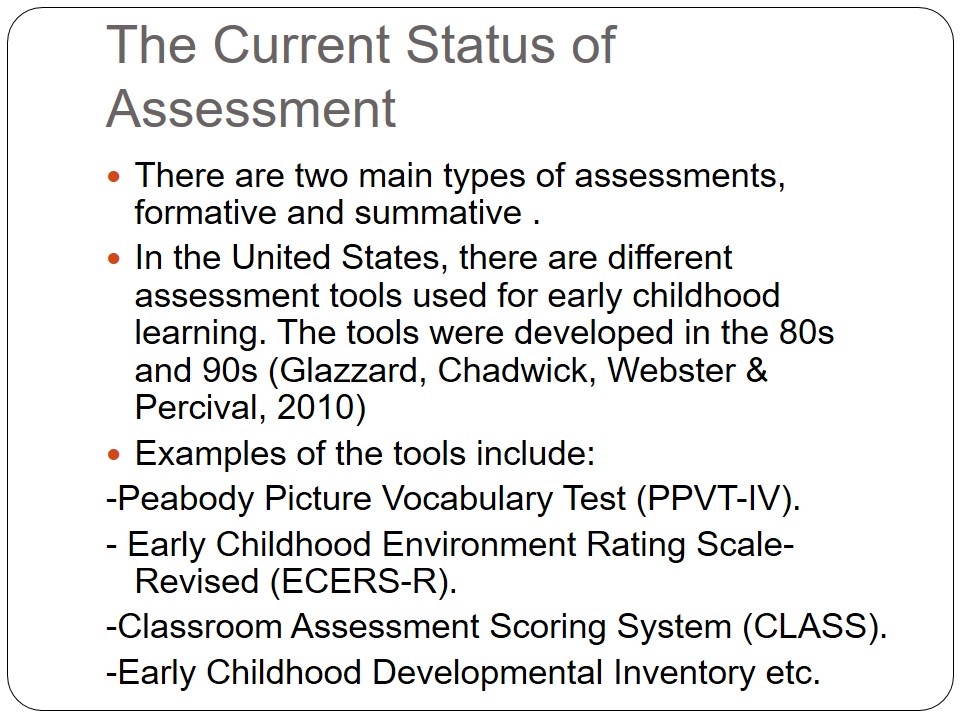
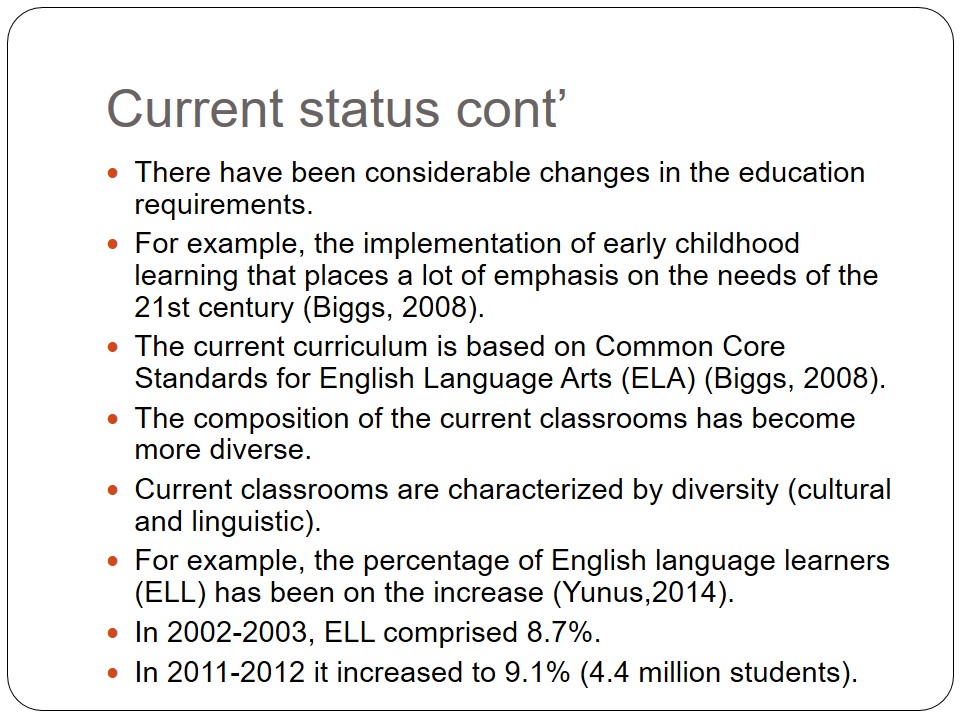
Changes
- The 21st Century presents a complex and different learning and assessment processes.
- Thus, there is the need for changes in assessments that will take into account the current diversity and needs of 21st century (Biggs, 2008).
- The current assessment of the learning process of the children is teacher centered.
- It does not emphasize the use of technology.
- Parents are minimally involved.
- This negates the role of parents in development of the children.
Parents provide innumerable opportunities. They are the voice of children and hence should be fully involved in the early developmental stages of their children.
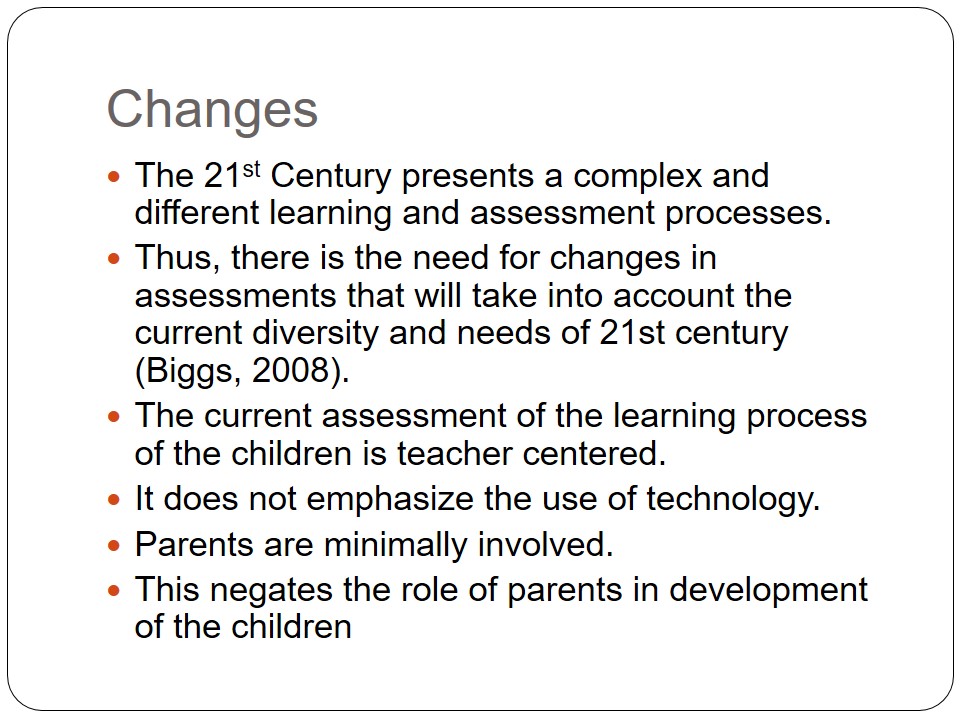
Desired Changes
- To introduce a program for testing the children’s technological skills and competence.
- To influence parents to push for policy that promote effective assessment of learning.
- To include parents in the assessment process of the children.
- Thesis: Engaging parents and guardians throughout the learning processes of their children will improve the level of morale, address challenges, and promote the best educational outcomes. This should entail advocacy initiatives and policy formulation based on the current needs of children.
Professional teachers can assist the parents in the advocacy of their children development and other’s children. Parents are the primary advocates for children. This is due to their interests in children. Therefore, the inclusion of parents presents an opportunity to enhance effective assessment of the children’s development.
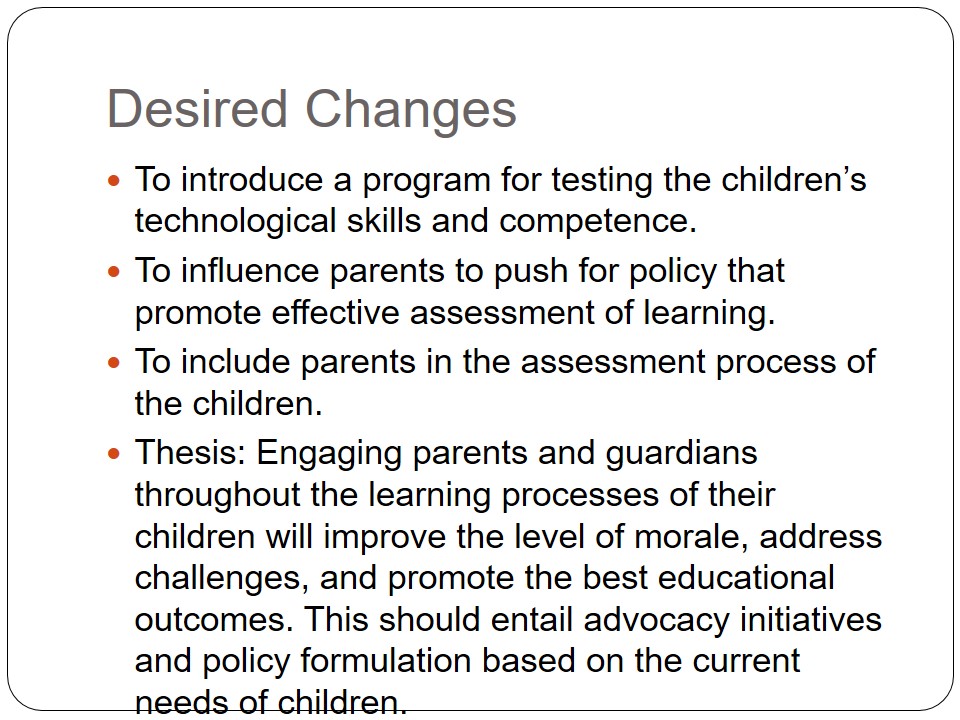
Arenas of Advocacy
There are three arenas of child advocacy in which early childhood educators can be involved.
- Public,
- Private,
- Personal.
N.B.: To achieve effective advocacy, each arena is based on specialized skills, knowledge and overall commitment to positive change (Brown & Rolfe,2009).
Parents have a critical role in promoting the wellbeing of the children by the enactment of a policy that will ensure assessment of children is inclusive and recognizes the diverse needs of the current classroom populations.
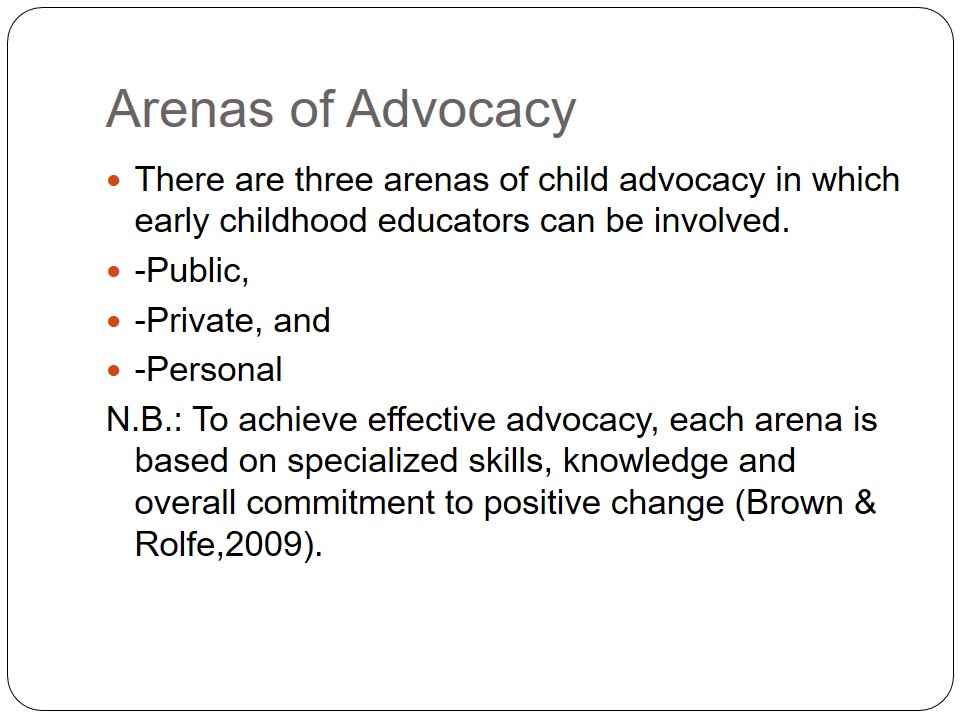
Public & Private Advocacy
- Public Advocacy:
- It entails the challenging the public systems in order to facilitate reform process that positively contribute to holistic development of children (Brown & Rolfe, 2009).
- Example, engaging in the policy formulation in order to ensure that the curriculum for the early childhood is aligned with assessments that address the core needs of the children.
- Private Advocacy: The advocacy targets businesses and institutions.
- This is because the entities are also involved in policies that affect the growth and development of children.
- The private sector is involved in the development of commercial learning materials.
- Example: Development of technological learning materials.
It challenges the budgetary processes, legislation, and administrative processes. This arena lobbies for adoption of laws, practices and budgetary allocations in order to make them responsive to the needs o children.
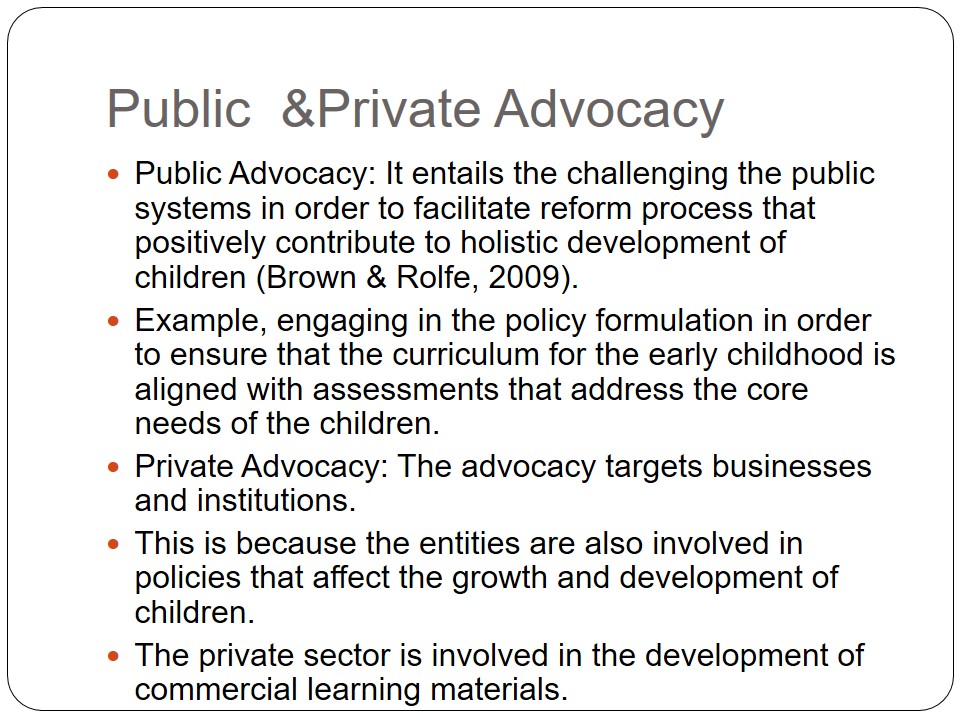
Personal Advocacy
- It involves personal effort.
- Taking advantage of the expertise, which people have in order to use them to promote children wellbeing (Brown & Rolfe, 2009).
- Personal advocacy efforts can lead to the development of new programs that are more appropriate for the children.
- Example: Approaches a curriculum developer and highlighting to him the importance of the development of assessment programs that are inclusive
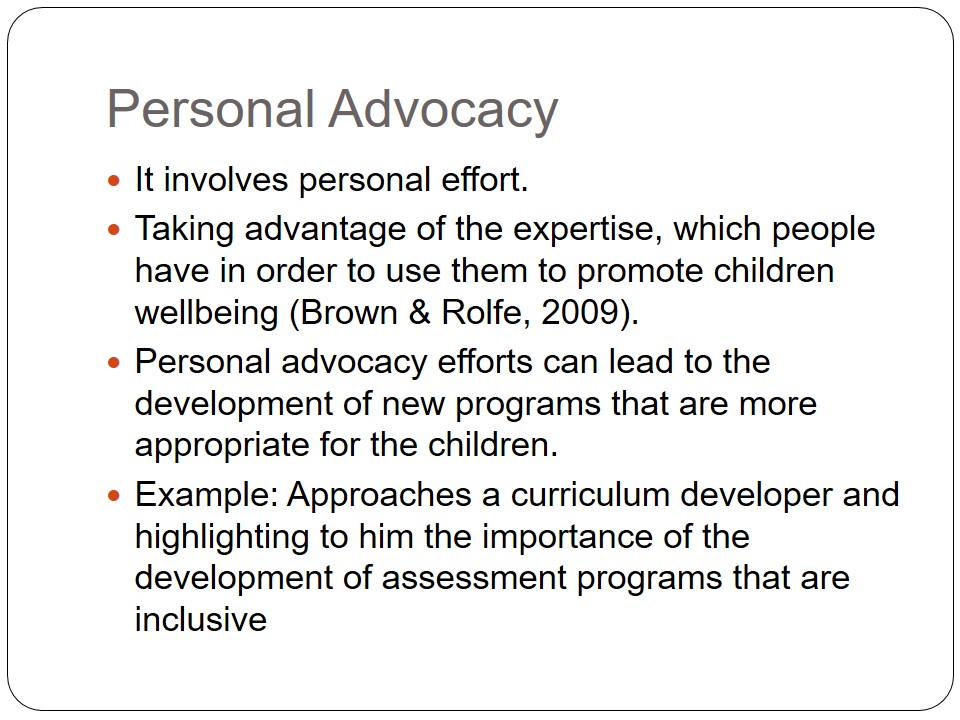
Implementing the Changes
- Organize public meeting to create awareness.
- To approach people and institutions involved in welfare of children and solicit for their professional help.
- To create an interactive platform for parents and guardians who champion for better policies that relate to early childhood learning.
- The advocacy strategies include:
- Creation of understanding and commitment among the stakeholders in the private and public arenas.
- To promote positive outcomes for children and families by extensively influencing public policy decisions.
- Promote specific decisions that promote the welfare of children by influencing individuals and groups.
It is worth noting that advocates are actively involved in identifying the issues that affect the children and bringing the issues to the people who can make positive changes (Lambert, Kim, & Burts, 2014).
Thus, the plan to implement the changes will include lobbying for policy changes at the public, private and personal level. This will be an inclusive process in participatory approach will be used to ensure collaborative decision-making process.
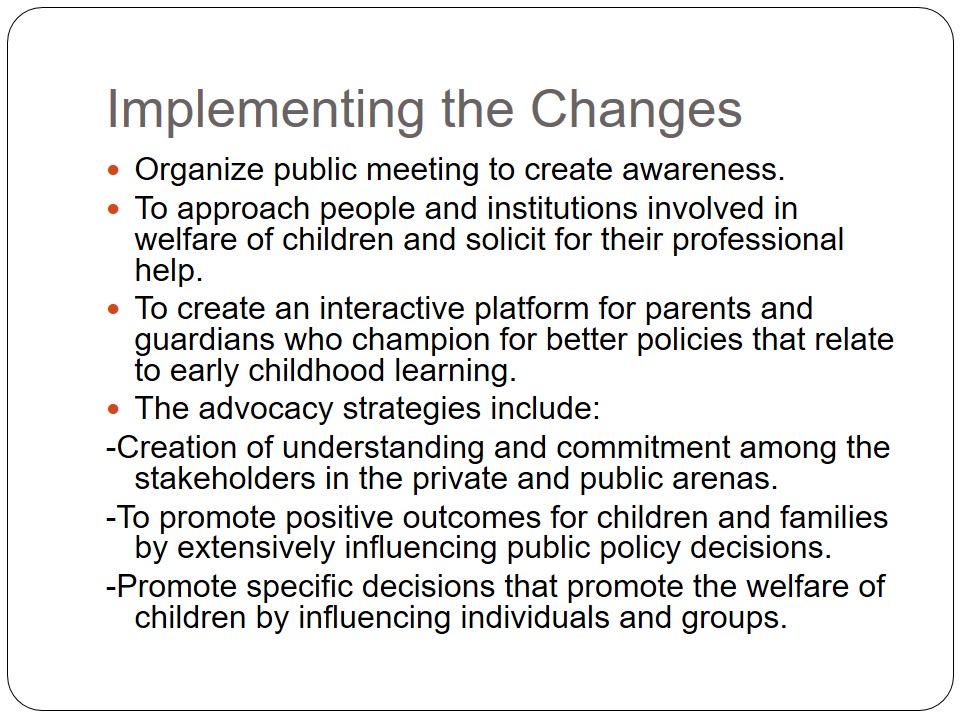
Plan for the Change
- The advocates of children normally build and expand the number of people that are willing to support the issues that affect children.
- Change starts with sharing ideas, engaging the stakeholders in the different arenas.
- Explaining why continuous assessments and effective assessments tools help in holistic development of children (Yunus, 2014).
- A clear time plan is essential to implement the changes.
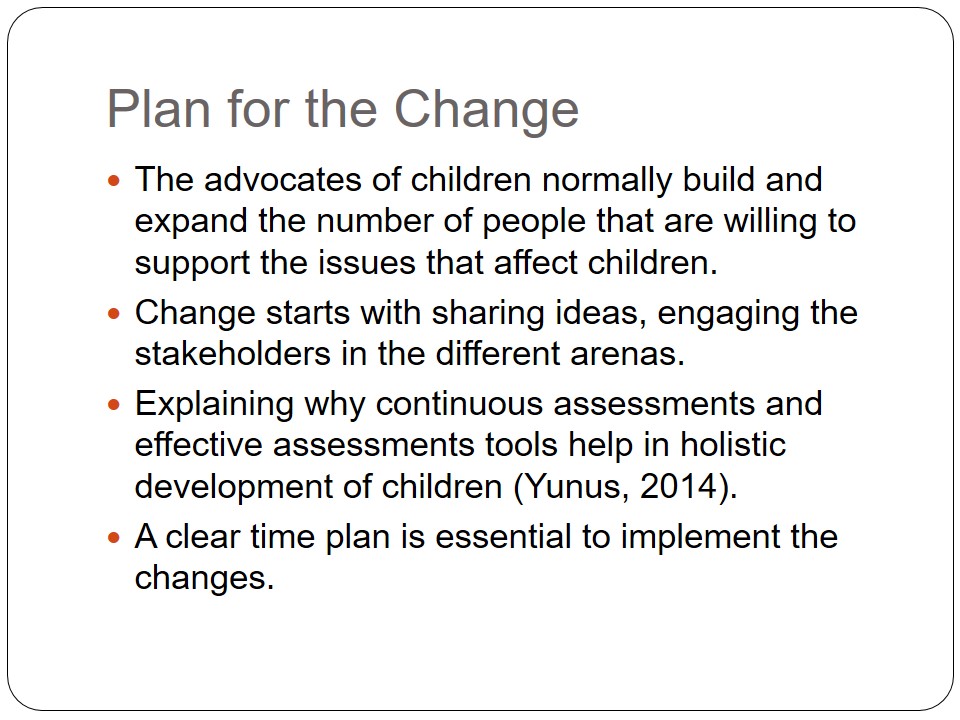
References
Biggs, J. (2008). Assessment and Classroom Learning: a role for summative assessment? Assessment in education, 5(1), 103-110.
Brown, J., & Rolfe, S. A. (2009). Use of child development assessment in early childhood education: Early childhood practitioner and student attitudes toward formal and informal testing. Early Child Development and Care, 175(3), 193-202.
Buck, L., & Willer, B. (n.d.). Advocacy for young children. Web.
Glazzard, J., Chadwick, D., Webster, A., & Percival, J. (2010). Assessment for learning in the early year’s foundation stage. New York: Sage Publishers.
Lambert, R., Kim, D., & Burts, D. (2014). Using teacher ratings to track the growth and development of young children using the teaching strategies GOLD assessment system. Journal of Psychoeducational Assessment, 32(1), 27-39.
Yunus, S. (2014).Teaching strategies GOLD: Assessment for development and learning of Young children. New York: Research Net.